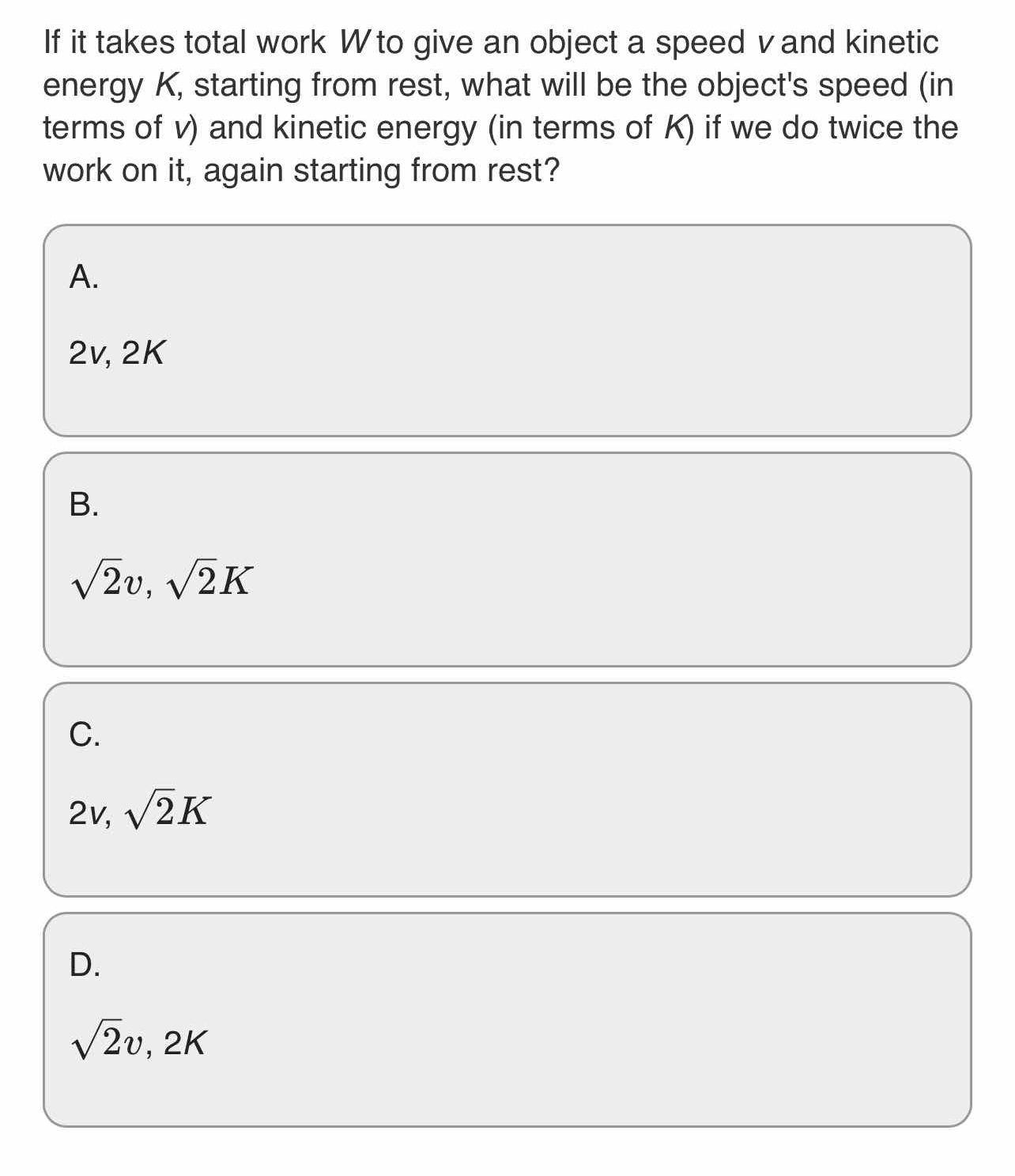If it takes total work W to give an object a speed v and kinetic energy K, starting from rest, what will be the object's speed (in terms of v) and kinetic energy (in terms of K) if... If it takes total work W to give an object a speed v and kinetic energy K, starting from rest, what will be the object's speed (in terms of v) and kinetic energy (in terms of K) if we do twice the work on it, again starting from rest?

Understand the Problem
The question is asking for the relationship between work done on an object and the resulting speed and kinetic energy when the work is doubled, beginning from rest. It seeks to find out how the values of speed and kinetic energy change when the total work is increased.
Answer
The new speed is $\sqrt{2}v$ and the new kinetic energy is $2K$.
Answer for screen readers
The object's new speed is $\sqrt{2}v$ and the new kinetic energy is $2K$.
Steps to Solve
- Understand Work and Kinetic Energy Relationship
The work done on an object is related to its kinetic energy (KE) by the equation: $$ W = \Delta KE $$ Where the initial kinetic energy is zero (since it starts from rest), this means: $$ W = KE = \frac{1}{2} mv^2 $$
- Initial Work and Kinetic Energy
Let the total work done to give the object speed $v$ and kinetic energy $K$ be $W = K$. From the equation, we have: $$ K = \frac{1}{2} mv^2 $$
- Doubling the Work
Now, when we double the work done, we have: $$ 2W = 2K $$
- Setting Up the New Kinetic Energy Equation
When we apply double the work, we can set up the kinetic energy equation as follows: $$ 2K = \frac{1}{2} mv'^2 $$ Where $v'$ is the new speed.
- Solving for the New Speed
Setting the two kinetic energy expressions equal gives: $$ 2K = \frac{1}{2} mv'^2 $$ Substituting $K = \frac{1}{2} mv^2$ yields: $$ 2 \left(\frac{1}{2} mv^2\right) = \frac{1}{2} mv'^2 $$
This simplifies to: $$ mv^2 = \frac{1}{2} mv'^2 $$
- Isolate and Solve for New Speed
We can simplify this by eliminating $m$ from both sides: $$ v^2 = \frac{1}{2} v'^2 $$ Multiplying both sides by 2 gives: $$ 2v^2 = v'^2 $$
- Calculate New Speed
Taking the square root of both sides provides: $$ v' = \sqrt{2} v $$
- Determine New Kinetic Energy
For the new kinetic energy, substituting $v' = \sqrt{2} v$ into the kinetic energy formula gives: $$ KE' = \frac{1}{2} m (\sqrt{2} v)^2 = \frac{1}{2} m (2v^2) = 2\left(\frac{1}{2} mv^2\right) = 2K $$
The object's new speed is $\sqrt{2}v$ and the new kinetic energy is $2K$.
More Information
When you double the work done on an object starting from rest, its speed increases by a factor of $\sqrt{2}$ and its kinetic energy doubles. This illustrates how work relates to energy changes in an object, emphasizing the quadratic nature of kinetic energy.
Tips
- Misunderstanding that work and kinetic energy have a quadratic relationship; simply doubling speed leads to quadrupling kinetic energy.
- Forgetting to account for the fact that the total work done affects both speed and kinetic energy in different ways.
AI-generated content may contain errors. Please verify critical information